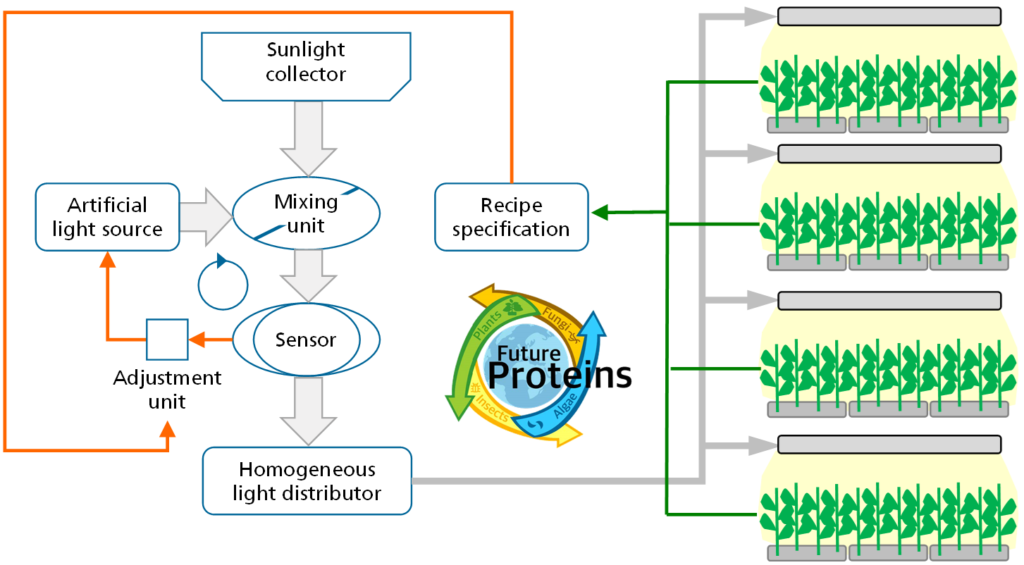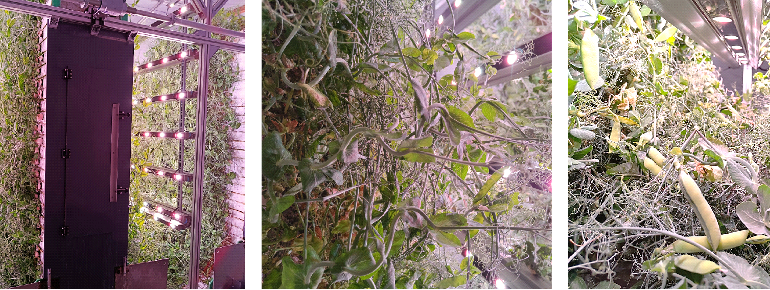OrbiLoop®/OrbiPlant® – Hybrid lighting system and cultivation of large, protein-rich food crops
This is the second of two blog posts with our AVF member Fraunhofer IME – you can read the first blog post «Addressing Vertical Farming Pain Points» and an introduction to the novel and innovative vertical farming platform technology OrbiLoop®/OrbiPlant® here.
Introduction
AVF recently caught up with Andreas Reimann, the senior patent and licensing manager of our AVF member Fraunhofer IME, to hear about the latest vertical farming news from the Institute’s New Agricultural Systems department.
Who is Fraunhofer IME?
The Fraunhofer Institute for Molecular Biology and Applied Ecology IME in Aachen, Germany is a pioneer in the field of plant-based research and part of the Fraunhofer-Gesellschaft, the world’s leading organization for applied research prioritizing the development of key future-relevant technologies with high social relevance. The organization is a not for profit, so does not sell any products but undertakes the research & development prior to partnering with businesses and organizations who want to use products or technology by license etc.
The New Agricultural Systems (NAS) department at Fraunhofer IME conducts research in the areas of vertical farming, plant-based meat, and single cell protein. The department originally focussed on their VertiPharm, a fully automated vertical farming unit with 8 layers, and 550 m2 of net cultivation area for various plant species and cultivation processes to produce recombinant biopharmaceuticals by Agrobacterium-mediated transformation using vacuum infiltration. The farm worked well but was complex with an expensive cost structure geared towards biopharmaceutical production that was difficult to transfer to the cost-sensitive production of food crops.
As of 2016 Fraunhofer IME began to look at the pros and cons of existing vertical farming technologies, how to improve them and what types of commercially viable food crops could be grown in them.
They looked at three areas:
- An improved alternative to the classical high rack system
- Utilizing sunlight directly or as part of a hybrid lighting system
- Cultivating larger, protein rich crops – Case Study for the German Veganz Group AG
This blog post focuses on the exciting developments that Fraunhofer IME has made in the utilization of sunlight via a smart hybrid lighting system in growing in vertical farms and in cultivating larger, protein rich crops.
Utilizing sunlight to reduce costs in Controlled Environment Agriculture
Within the Fraunhofer Lighthouse Project »FutureProteins« one of the newest exciting developments at Fraunhofer IME is, that in cooperation with Fraunhofer IOSB, they are about to trial a groundbreaking way of using direct sunlight optics in conjunction with artificial lighting and a smart lighting control system approach to dynamically provide light of defined wavelength ranges and light intensities for growing plants in an enclosed Controlled Environment Agriculture (CEA) environment.
How does this hybrid lighting system work?
To use the hybrid lighting system, it is necessary to site a sunlight capture system on the outside of the CEA environment, for example on the top of a shipping container or roof of a building. The system directly captures the sunlight as optical energy while following the position of the sun, splits it spectrally if required and brings it through fibres into the CEA environment and onto a lighting surface, which is additionally equipped with LEDs to cover 8 different wavelength ranges. A sensor-based control system ensures that a user-specific light recipe is constantly maintained so that the plants always receive the correct lighting, that is a defined spectral light mixture at a defined intensity. If sufficient sunlight is available, the hybrid lighting system draws its light energy exclusively from the sun – if the sunlight is not sufficient, the integrated LEDs add light in the required wavelength spectrum and intensity. In this system the sunlight captured stays in the same energy form, thereby retaining much more energy between capture and utilization in the CEA environment than when using solar photovoltaics (PV), which capture sunlight with semiconductor materials and turn it into direct electrical current, which again has to be converted into optical energy via LEDs. In this type of PV-based lighting system the energy loss is significantly higher due to the multiple transformation steps.

Schematic illustration of the hybrid lighting system that has been developed as part of the Fraunhofer Lighthouse Project »FutureProteins« (© Fraunhofer IME).

3D visualisation of the sunlight collector mounted on a container (© Fraunhofer IOSB)
The prototype is being trialed from next month to begin data collection on an ongoing basis – watch this space. If the prototype is successful and economically viable, it will help vertical farms save on lighting energy costs while maintaining the flexibility and specificity of a multi-channel lighting approach – an important prerequisite when plant growth trials have to be performed under wavelength-specific conditions. While not as cost effective as direct sunlight, using the hybrid lighting systems provides an innovative basis to harness the power of solar energy in applications that do not allow the direct use of sunlight while simultaneously offering the benefit of wavelength specific illumination.
Cultivating larger, protein rich crops – Case Study for the German Veganz Group AG
Fraunhofer IME wanted to understand and research how vertical farming can help with food security. One of the drawbacks of vertical farming has been the difficulty in cultivating larger, protein rich crops, and doing so in a commercially viable way. This means finding and researching with crops beyond traditional leafy greens, microgreens and soft fruit with those plants that are nutritious and protein rich. Growing plants that would meet these criteria are usually larger plants and growing larger plants in a vertical farming system typically introduces issues of volume efficiency, as larger plants require more growing volume, reducing the overall efficiency of a vertical farming system per given footprint as well as issues of stability due to the increased size of the mature plant.
This led to Fraunhofer IME entering an exciting research partnership with Veganz Group AG two years ago to establish the production of pea plants in the OrbiPlant® system for pea protein.
The development of the novel and innovative OrbiPlant® technology opens the possibility for industrial vertical farming production of large, protein-rich food crops of the highest yield and quality. OrbiPlant® is a vertical farming platform technology that uses an innovative rotating conveyor belt system where plants grow aeroponically directly in the conveyor belt as it moves. In an R&D cooperation with the Veganz Group AG, Fraunhofer IME researched growing pea plants using the OrbiPlant® system. The unique meandering conveyor path of the OrbiPlant® system induced a favorable pea plant growth phenotype with a curved stem and a small growth height. The results were impressive, as the biomass weight and the pea yield per plant were equally high despite the smaller growth height. At the same time the pea plants could be grown more densely while the quality of the plants remained consistently high. As the plants grew densely and intertwined, they supported each other, while it only needed a fraction of the growing space to produce many more peas.

Image 1: High density pea plant cultivation in OrbiPlant® without any support aid. Image 2: Favorable grain pea plant growth phenotype with curved stem, small height, high biomass volume density and strong standing stability. Image 3: Pea pods developed during high density grain pea plant cultivation in OrbiPlant®.
How did the vertical OrbiPlant® pea yield compare to open field growing?
Compared to conventional open field production the pea yield dry weight was up to 90 times higher per m2 footprint and year in the vertical OrbiPlant® system – the system produced 21 kg of high protein pea dry biomass. The research showed that protein rich food can be produced efficiently with OrbiPlant®.
In a next step, Veganz acquired worldwide licensing rights for the platform technology, paving the way for the Veganz OrbiFarm® system development and the production of protein plants on an industrial scale.
If you would like to know more about OrbiLoop®/OrbiPlant® and possibilities for project cooperation then contact the NAS vertical farming group leader Dr. Marc Stift at Fraunhofer IME, and you can come and meet the team at VertiFarm 08-10 October 2024, Messe Dortmund, Germany.
If you are interested in licensing or buying the OrbiLoop®/OrbiPlant® platform technology or the hybrid lighting technology, please contact Andreas Reimann.


Comments are closed.